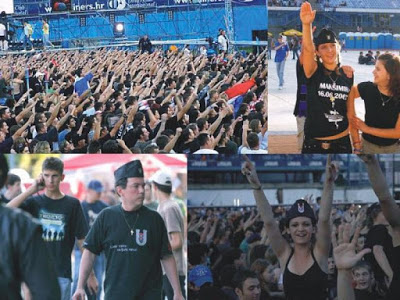What better occasion for my first post here in 2019 than President Vladimir Putin's first foreign trip this year!
Even before he landed, the Russian leader was given an honor guard by Serbian air force MiGs, a 2017 gift from Moscow to replace those destroyed by NATO during the 1999 air campaign that ended with the occupation of Serbia’s province of Kosovo. Russia has refused to recognize Kosovo’s US-backed declaration of independence, while the US and EU have insisted on it.
Upon landing, Putin began his first official trip of 2019 by paying respects to the Soviet soldiers who died liberating Belgrade from Nazi occupation in 1944. While most Serbians haven’t forgotten their historical brotherhood in arms with Russia, it did not hurt to remind the West just who did the bulk of the fighting against Nazi Germany back in World War II.
(Read the rest on RT.com)
A couple things left on the editing room floor: Yes, Bosnia-Herzegovina is technically not in NATO either, but it's basically still a EU/NATO protectorate, so it doesn't count. It was also blatantly obvious that Vucic sought to use Putin to bolster his credibility in Serbia, but Putin deftly sidestepped that by saying only "Thank you for your friendship" to the crowd gathered outside the church and carrying on with his visit.
The point a lot of people miss is that Russia can definitely tell the difference between Serbia and whoever rules it, which is a distinction lost on not just the West, but many of its acolytes and cultists on the ground.
The one-day visit to the last holdout against NATO’s ambitions in the Balkans may have been somewhat short on substance, but was certainly loaded with symbolism.Putin's 1st official trip of 2019https://t.co/LdUMu5Mzpa— RT (@RT_com) January 18, 2019
Even before he landed, the Russian leader was given an honor guard by Serbian air force MiGs, a 2017 gift from Moscow to replace those destroyed by NATO during the 1999 air campaign that ended with the occupation of Serbia’s province of Kosovo. Russia has refused to recognize Kosovo’s US-backed declaration of independence, while the US and EU have insisted on it.
Upon landing, Putin began his first official trip of 2019 by paying respects to the Soviet soldiers who died liberating Belgrade from Nazi occupation in 1944. While most Serbians haven’t forgotten their historical brotherhood in arms with Russia, it did not hurt to remind the West just who did the bulk of the fighting against Nazi Germany back in World War II.
(Read the rest on RT.com)
A couple things left on the editing room floor: Yes, Bosnia-Herzegovina is technically not in NATO either, but it's basically still a EU/NATO protectorate, so it doesn't count. It was also blatantly obvious that Vucic sought to use Putin to bolster his credibility in Serbia, but Putin deftly sidestepped that by saying only "Thank you for your friendship" to the crowd gathered outside the church and carrying on with his visit.
The point a lot of people miss is that Russia can definitely tell the difference between Serbia and whoever rules it, which is a distinction lost on not just the West, but many of its acolytes and cultists on the ground.

